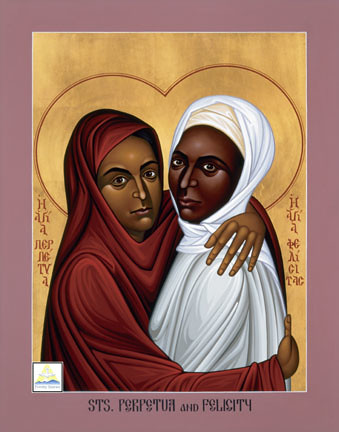
Martyrs, Mothers, Catechumens, Companions
Sts. Perpetua and Felicity
We know of Perpetua and Felicity’s story because of the diary Perpetua kept while she and her companions were awaiting execution. Not only is this text rare for its account of early Church martyrs in the days leading up to their deaths, but it is one of the earliest first-person narratives by a woman writer. Perpetua’s chronicle is introduced by and completed with the testimony of an eyewitness.
Along with Revocatus, Saturninus, and Secundulus, Perpetua and Felicity were kept in a dungeon in the days leading up to their martyrdom. Perpetua, a young married woman aged twenty-two, had a loving family and an infant son. In the trial preceding their imprisonment, her father pleaded with her to renounce Christianity and, thus, be released. She stood firm in her faith, responding:
‘Father,’ said I, ‘do you see, let us say, this vessel lying here to be a little pitcher, or something else?’ And he said, ‘I see it to be so.’ And I replied to him, ‘Can it be called by any other name than what it is?’ And he said, ‘No.’ ‘Neither can I call myself anything else than what I am, a Christian.’
A few days later, the catechumens were baptized, about which Perpetua wrote, “and to me the Spirit prescribed that in the water of baptism nothing else was to be sought for bodily endurance.” Anxious about her young son, Perpetua was permitted to bring her infant with her into the dungeon so as to care for him until he could be weaned and entrusted to the care of her family.
For her part, Felicity was eight months pregnant at the time of their imprisonment. Because the public punishment of pregnant women was not permitted, she was greatly distressed that she might not be sent into the arena with her companions. After much prayer, she went into labor and delivered a healthy baby girl who was adopted by a Christian sister. When mocked for her pain during childbirth and questioned about her ability to withstand the torments of the wild beasts by a Roman soldier, Felicity responded, “Now it is I that suffer what I suffer; but then there will be another in me, who will suffer for me, because I also am about to suffer for Him.”
“Now it is I that suffer what I suffer; but then there will be another in me, who will suffer for me, because I also am about to suffer for Him.”
In lieu of a final meal, the martyrs celebrated an agape supper, an early Christian ritual. Though pressured to change into the vestments of pagan religion before they entered the arena, Perpetua advocated for the martyrs’ freedom to the last, and they were allowed to remain in their simple clothing. They entered singing. Perpetua continued to be concerned with how they were presented as they were attacked, fixing her disheveled tunic and hair, “lest she should appear to be mourning in her glory.” When Felicity was knocked down by the savage cow released on the women, Perpetua grabbed her hand and helped her stand.
Since the beast did not conquer them, it was decided that they were to be beheaded. Perpetua and Felicity stood facing each other and exchanged a kiss as a sign of peace. The witness attests that Perpetua herself needed to guide the gladiator’s blade to her throat, for the young soldier’s hand was wavering. Or, rather, “possibly such a woman could not have been slain unless she herself had willed it, because she was feared by the impure spirit.”
Feast Day : March 7th

